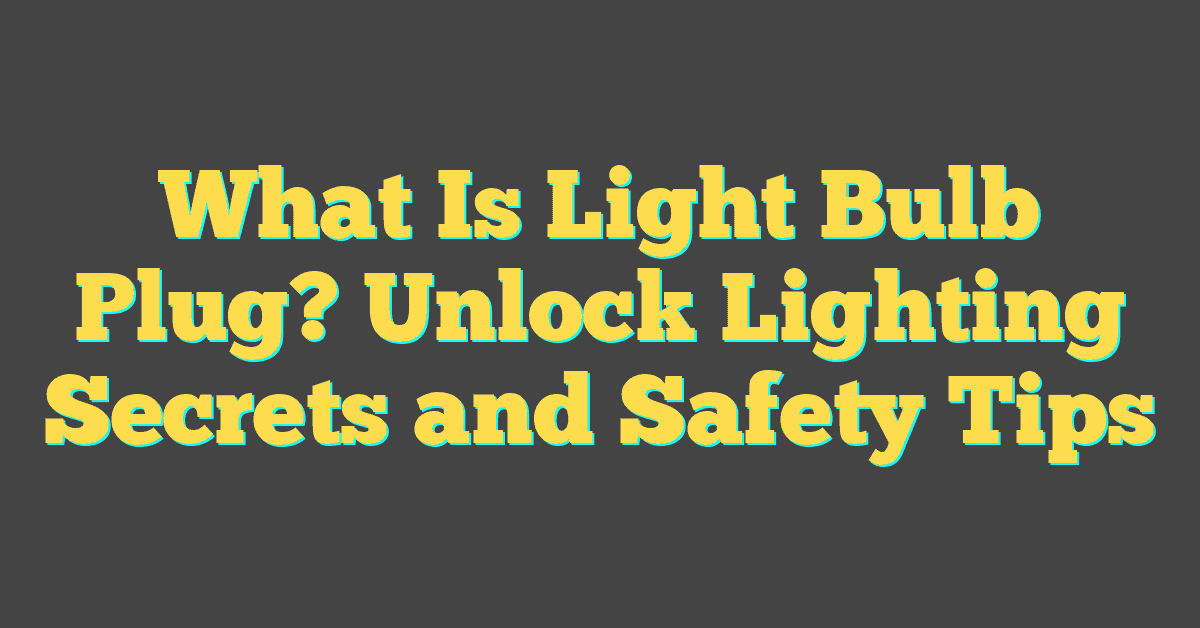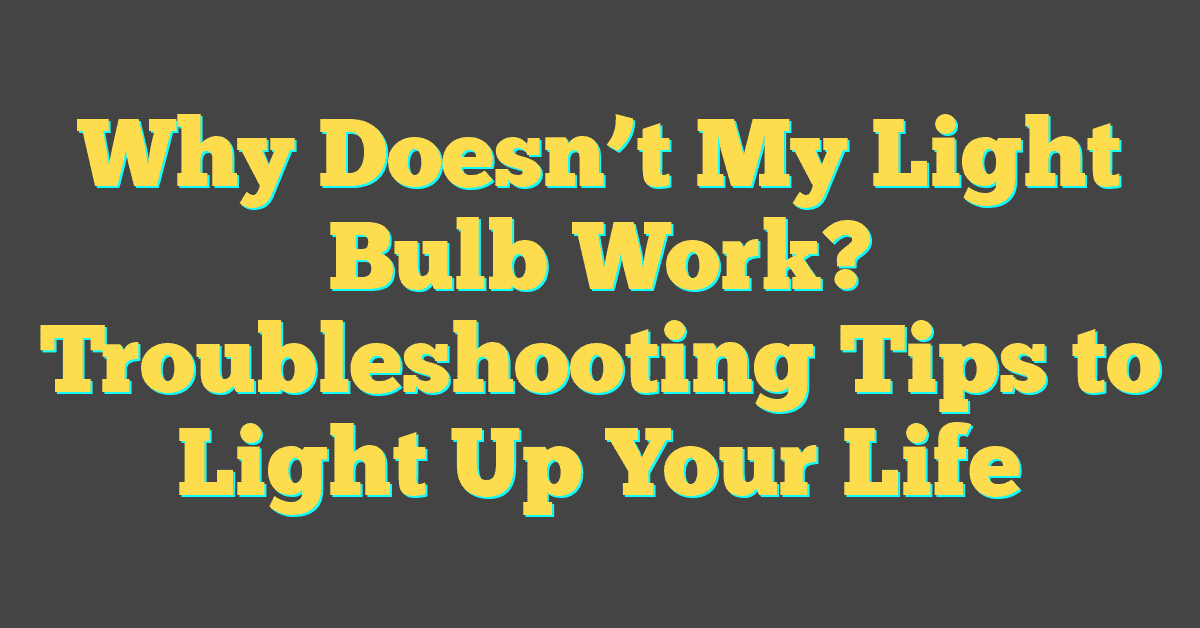Ever been startled by a loud pop from above, only to find your trusty light bulb has bitten the dust—spectacularly? It’s not just your bad luck; light bulbs can and do explode, though it’s a rare occurrence. You might wonder what’s behind these surprising little fireworks in your lamp or ceiling fixture.
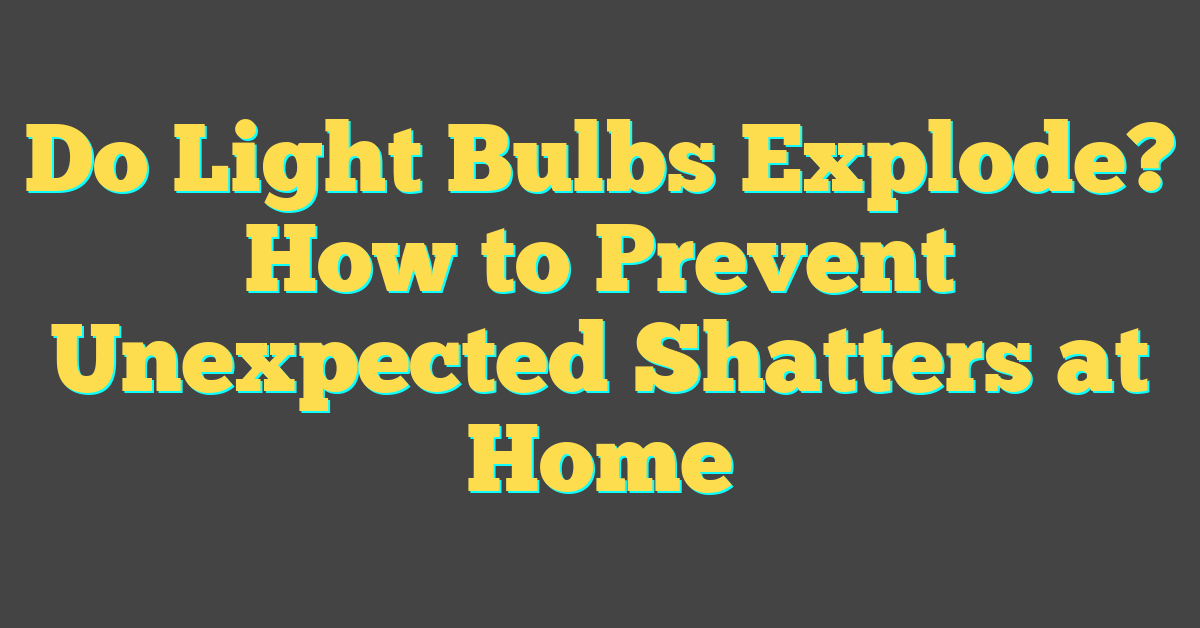
Knowing why these glassy gadgets go boom could save you from a shocking experience, or at least spare you a cleanup on aisle living room. So, let’s shed some light on the explosive potential of the humble light bulb and keep your home’s illumination safely glowing.
Why Do Light Bulbs Explode?
Ever walked into a room and been greeted by the sharp pop of a light bulb going caput? You’re not alone. Many DIY enthusiasts and light aficionados have encountered this startling event. There’s a spark of science behind why light bulbs decide to go out with a bang.
Manufacturing Defects often top the list. Tiny cracks or imperfections in the glass can compromise the bulb’s integrity. When the temperature changes rapidly, these little issues can turn into big problems, leading to an explosion.
Overheating is another culprit. Light bulbs are designed to dissipate heat, but sometimes they’re confined in spaces with poor ventilation. Think about those recessed light fixtures; they’re sleek but can turn into saunas for your bulbs. With nowhere for the heat to go, the pressure builds up until, boom, you’re left in the dark.
And don’t forget about Electrical Surges. They’re the sneak thieves of the lighting world, striking quick and leaving a mess. A sudden surge can send too much current coursing through the filament. The bulb’s not built to handle that power trip, and just like that, you have a mini fireworks display minus the oohs and aahs.
It’s also about the forensics of failures. Consider bulb types when you’re conducting your own light bulb investigation:
- Incandescent Bulbs: Prone to thinning out over time, which can lead to a fragile state where any stress could spell disaster.
- CFLs (Compact Fluorescent Lamps): Contain gases that react poorly if the bulb is compromised. A crack can turn into a catastrophic failure here.
- LEDs (Light Emitting Diodes): Surprisingly sturdy, explosions are rare, but not impossible, often due to faulty wiring or manufacturing issues.
The Factors That Contribute to Light Bulb Explosions
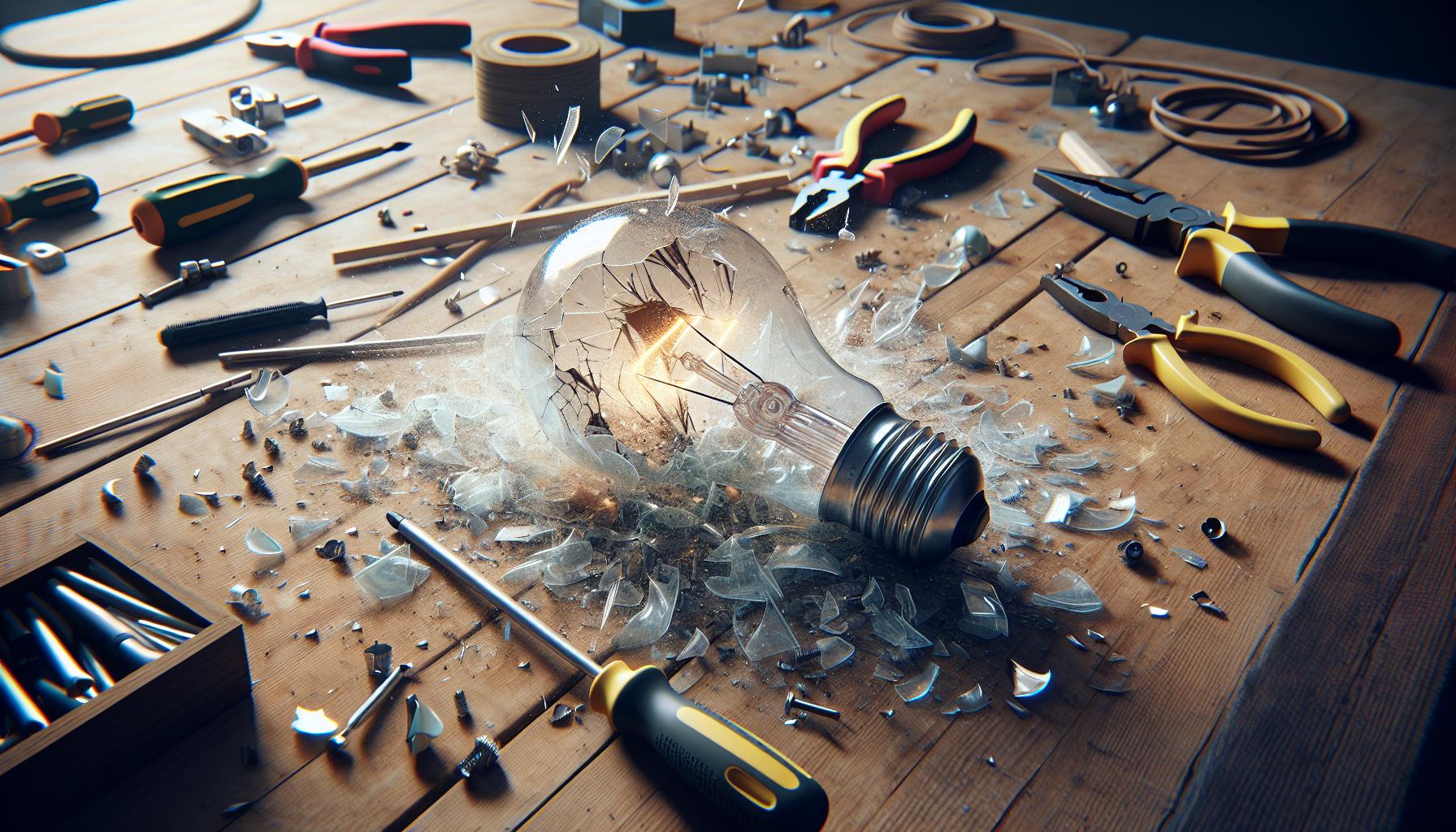
As a light bulb aficionado with a knack for home DIY projects, you’re always curious about the finer details of how things work and, sometimes, how they fail. When considering the unexpected phenomenon of light bulb explosions, it’s crucial to dig into the factors that lead up to these startling events.
Poor Installation is a primary culprit. It might seem like a no-brainer to screw in a light bulb, but even the slightest error can set the stage for a problem. Bulbs that are not seated properly can lead to poor contact with the socket, causing arcing—a form of electrical discharge—that heats up the bulb rapidly and may lead to a burst.
Next, consider the Voltage Fluctuations in your home. These can stem from inconsistent power supply or the presence of high-powered appliances on the same circuit. Any significant surge of electricity can overwhelm a bulb’s filament or circuitry making it susceptible to explosions or fizzling out prematurely.
Let’s not overlook Environmental Conditions. Moisture in the air and particularly in outdoor settings can create a fatal predicament for your bulbs. When the warm surface of a lit bulb comes into contact with water droplets, thermal stress ensues, which can crack the glass or worse—cause it to explode.
For the eco-minded and cost-conscious, switching to energy-efficient bulbs like CFLs and LEDs seems like a bright idea. However, even these advanced options have their Achilles’ heel. Without proper Ventilation, LED bulbs accumulate heat internally, leading over time to a breakdown of components, including the risk of bursting.
Lastly, examine the Quality of the Bulb itself. As with anything, you get what you pay for. Cheaply manufactured bulbs may not adhere to safety standards or could have imperfections that go unnoticed until failure. High-quality bulbs undergo rigorous testing to minimize explosion risks, so investing a little more upfront can save you from unexpected shatters and sparks.
In your pursuit to illuminate your home both safely and stylishly, being aware of these factors can help you make informed decisions on lighting that won’t leave you in the dark. Whether you’re installing lights in your next DIY project or simply replacing a burnt-out bulb, keeping an eye on these details can prevent an explosive situation.
Overheating: A Common Cause of Light Bulb Explosions
« Why Would a Light Bulb Explode When Turned Off? Uncover the Shocking Reasons
Why is Light Bulb Important? Discover Its Role in Safety and Productivity »
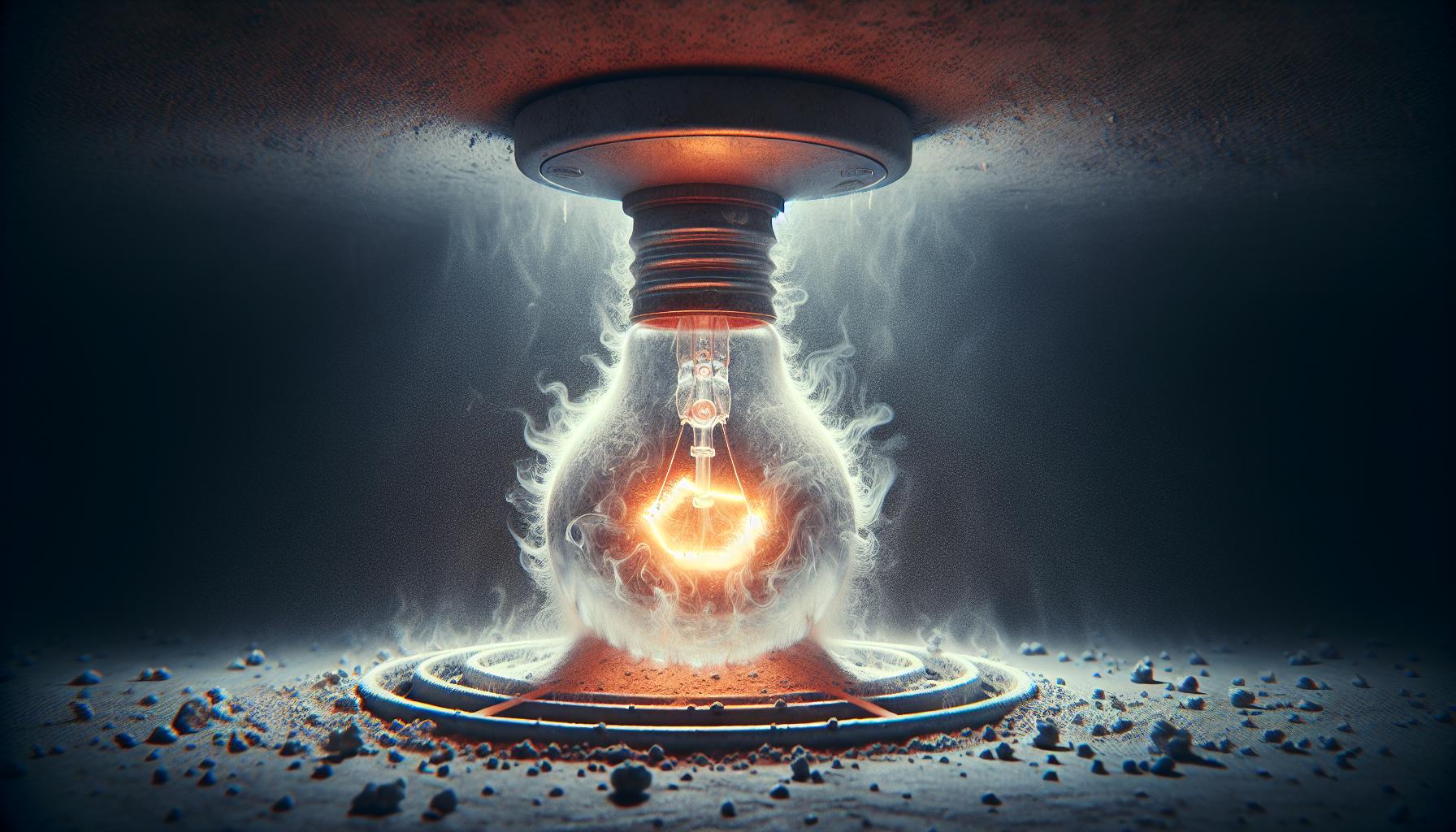
You’ve probably experienced it at least once: that mini-heart attack moment when a light bulb unexpectedly pops! While there could be a myriad of reasons behind this startling event, one of the most common culprits is overheating. A bulb’s operational temperature is key to its longevity and safety. But when a bulb overheats, the risk of an explosion increases significantly.
So, what exactly leads a seemingly innocent bulb to overheat? Here’s the rundown:
- Inadequate Ventilation: Light fixtures and enclosures must allow heat to dissipate. When they don’t, heat builds up, leading to potential bulb failure.
- Exceeding Wattage Ratings: Using bulbs that exceed the recommended wattage for your fixture can produce excess heat – a definite no-no.
- Dust Accumulation: You might not think of it, but a layer of dust acts as an insulator, trapping heat and causing temperatures to spike.
- Extended Usage: Let’s face it, sometimes you forget to turn off the lights. Bulbs burning for extended periods tend to overheat, particularly in closed fixtures.
To keep your bulbs running cool, consider these tips:
- Ensure fixtures are clear of obstruction for optimal airflow.
- Always adhere to manufacturer wattage recommendations for your fixtures.
- Clean bulbs and fixtures regularly to prevent dust build-up.
- Opt for LED bulbs, which are designed to run cooler than traditional incandescent or halogen bulbs.
Remember, overheating isn’t just an issue for incandescent bulbs. Even CFLs and LEDs, though cooler-running, can fall prey to excessive temperatures if not properly maintained. So, next time you’re tackling that home DIY project or choosing the perfect lighting, give a thought to proper ventilation and correct bulb usage. It’s not just about efficiency; it’s about safety too. Keep your home and family safe by being proactive about preventing light bulb overheating.
The Risks and Dangers of Light Bulb Explosions
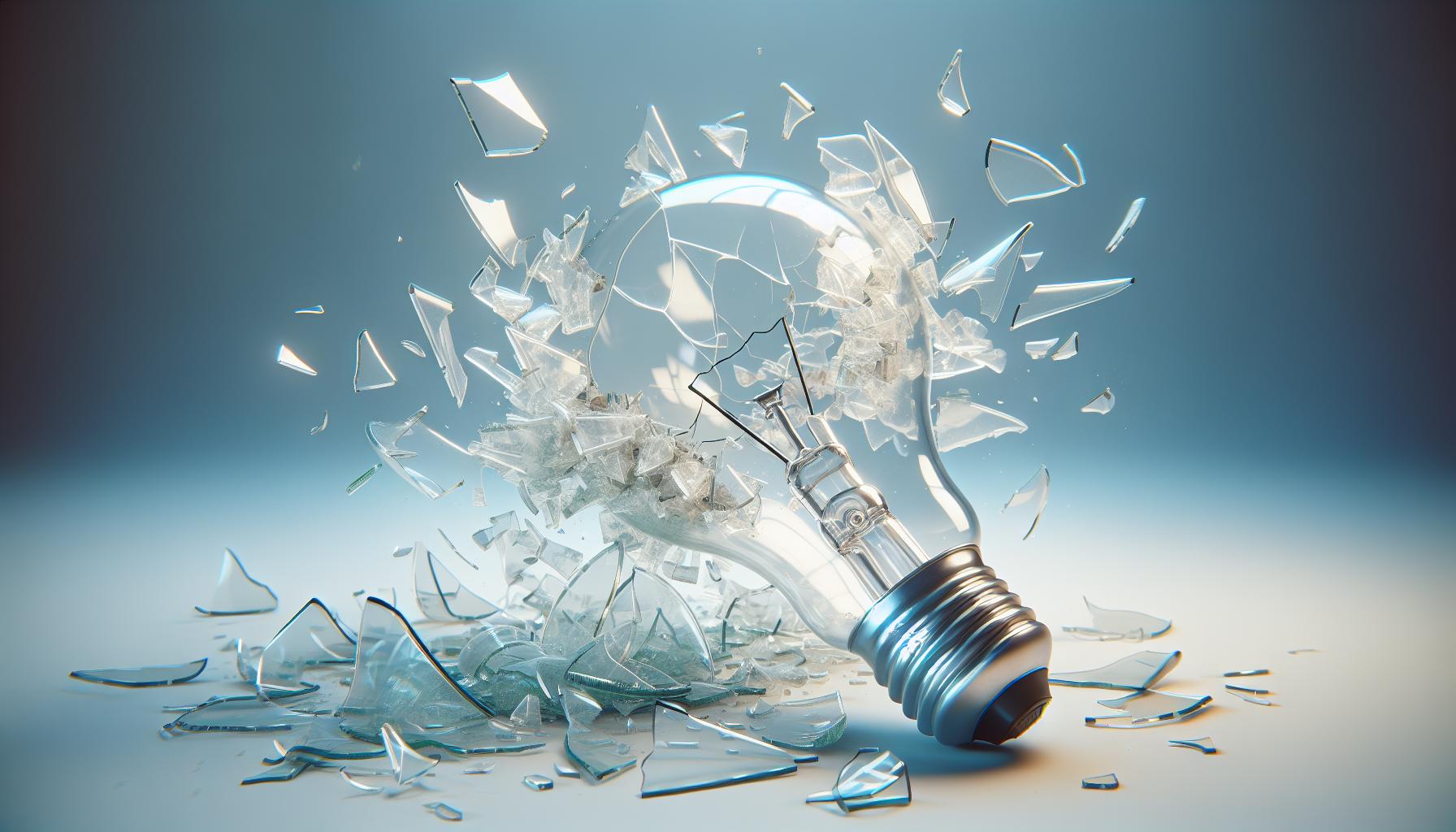
Becoming aware of the potential hazards a light bulb explosion can pose is key to ensuring your safety at home. First off, the immediate risk of physical injury cannot be overstated. Shards of glass can scatter, leading to cuts or even more serious injuries, particularly if the explosion catches anyone nearby off-guard.
Beyond the obvious physical harm, there’s a chance of electrical fires stemming from the bulb’s failure. An explosion might damage the fixture or wiring, possibly igniting surrounding flammable materials. Given your knack for DIY, you’ll understand just how quickly a small spark can escalate into a major emergency.
Let’s talk about toxins and chemicals. Traditional incandescent bulbs might not be a big concern here, but compact fluorescents (CFLs) and some other types are filled with substances like mercury vapor, which can be harmful if inhaled or if they contaminate the environment. It’s always a smart move to avoid exposing yourself and others to these potentially toxic materials.
Then there’s the psychological aspect—a sudden burst from a light bulb can be startling and create a sense of anxiety around what should be a safe and comforting environment. Yes, something as simple as a light bulb can shake your sense of security at home.
And let’s not forget about the inconvenience factor. Even if no one is hurt and nothing else is damaged, dealing with the aftermath of a light bulb explosion—cleaning up glass, checking and replacing fixtures, and restoring lighting—can add an unexpected hassle to your day.
Remember, while light bulb explosions are relatively rare, savvy homeowners like you know it’s important to take precautions. Keep up with your routine of checking and maintaining your home lighting. Your proactive steps can mitigate these risks and danger, and you’ll feel more at ease knowing you’ve done your bit for a safer home.
How to Prevent Light Bulb Explosions
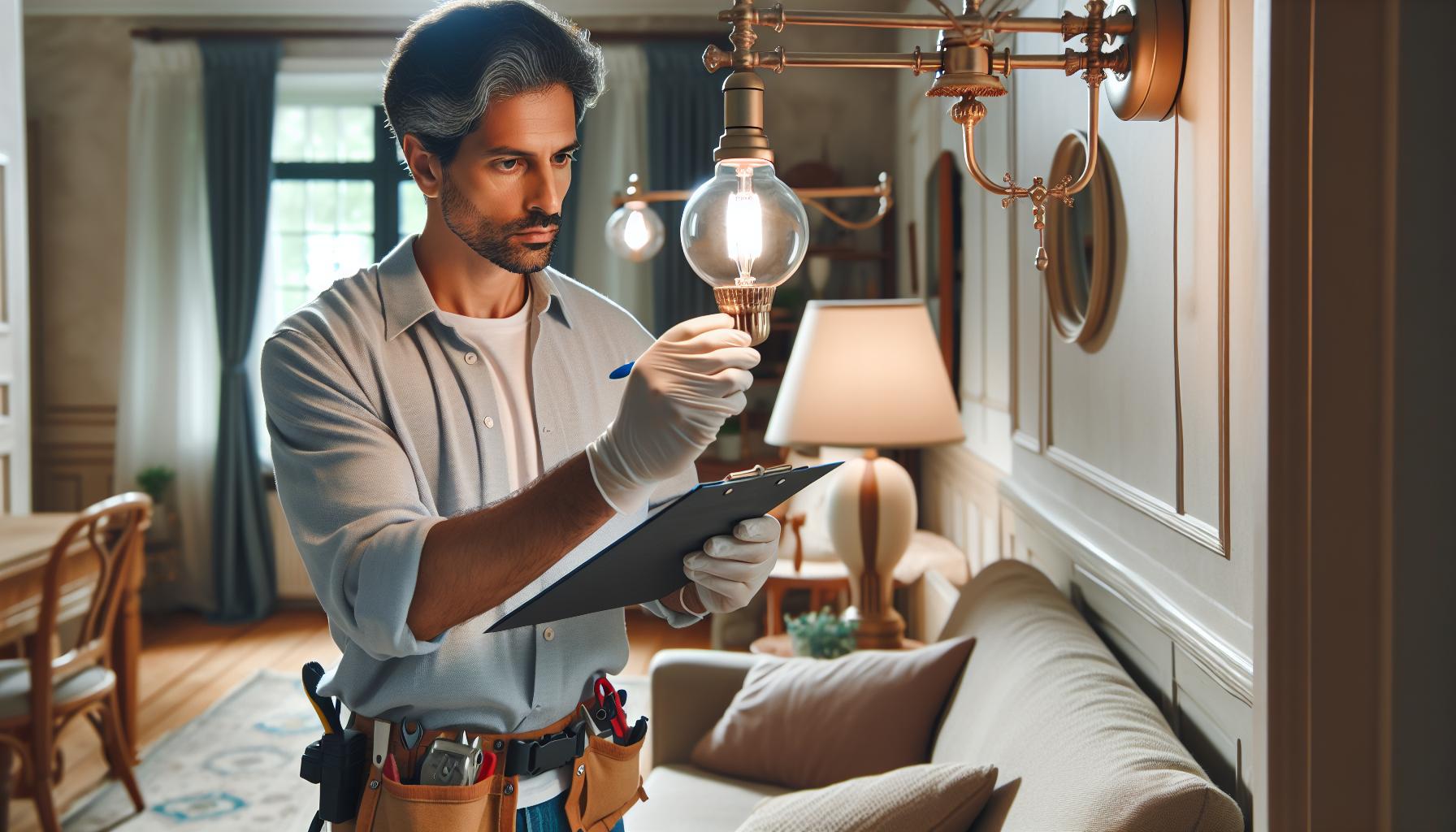
Preventing light bulb explosions is key to maintaining a safe household. Regular maintenance is your first line of defense. This means periodically checking your light fixtures for any signs of wear or damage. If you’re someone who enjoys diving into home DIY projects, here are a few steps you can take to mitigate the risks:
- Check Light Fixtures: Inspect your light fixtures regularly. Look for signs of damage or corrosion in the sockets. If you find any, it’s time for a replacement.
- Proper Installation: Ensure bulbs are screwed in securely but not too tightly. Over-tightening can cause the base to break, leading to a short circuit.
- Right Wattage: Use bulbs that match the recommended wattage of your lamps and fixtures. Exceeding wattage can lead to overheating, which is the primary cause of light bulb explosions.
- Quality Bulbs: Invest in quality bulbs. While the upfront cost is higher, they last longer and are less prone to malfunction.
- Ventilation: Good ventilation around your light fixtures prevents bulbs from overheating. Make sure lampshades and fixtures allow heat to escape.
- Switch Off: Always switch off the power at the circuit breaker before replacing a bulb to avoid electric shock.
- Temperature: Be cautious with bulbs in environments that experience frequent temperature changes. Extreme shifts can weaken the bulb and cause it to burst.
- Check Compatibility: If you’re upgrading to LED or smart bulbs, ensure they’re compatible with your existing fixtures.
Caring for light bulbs doesn’t require a lot of effort, but it does demand attention to detail. As someone who loves crafting the perfect ambiance with lights, taking these precautionary steps can help you continue to brighten your home safely. Plus, engaging in regular light bulb care complements your passion for lighting and home DIY projects by extending the life of your bulbs and fixtures. Keep an eye on new bulb technologies as they continue to evolve, and always stay informed about the best practices for your lighting needs.
Conclusion
So there you have it! Keeping your light bulbs in check doesn’t just prevent the rare but startling bulb explosion—it also contributes to the overall safety and efficiency of your home. Remember to stay vigilant about the state of your fixtures and make smart choices when purchasing and handling bulbs. By embracing these simple habits, you’re not just lighting up your space; you’re also ensuring peace of mind. Stay bright and safe!
Frequently Asked Questions
What can cause a light bulb to explode?
Light bulbs can explode due to several factors such as using a bulb with a wattage that exceeds the light fixture’s recommendation, poor quality bulbs, faulty installation, inadequate ventilation, or temperature fluctuations.
How can I prevent light bulb explosions?
Prevent light bulb explosions by ensuring you use the correct wattage, invest in quality bulbs, properly install the fixtures, maintain good ventilation around lights, and handle bulbs with care, particularly when temperatures change.
Is it important to check light fixtures regularly?
Yes, it is important to regularly check light fixtures for signs of wear, damage, or loose connections to prevent potential hazards, including light bulb explosions.
What should I do before replacing a light bulb?
Before replacing a light bulb, always switch off the power to the fixture to avoid electric shock and prevent damage to the new bulb.
How does proper care for light bulbs benefit my household?
Proper care for light bulbs can lead to increased safety, longer bulb lifespan, reduced risk of unexpected bulb failures and explosions, and greater energy efficiency in your household.

